#earl of epigram
Explore tagged Tumblr posts
Text
See, the thing is, a couple of different friends that went alone to see Wilde on his deathbed reported that his last words were, "Either this wallpaper goes, or I do."
Which means in his delirious, dying, agonizing last hours, he thought of a clever phrase and made sure he kept saying it each time a friend would visit to make sure that'd get penned down as his last words.
If that is not the Biggest mood in the entire world, I don't know what is.
-Xanthe
0 notes
Text
XVII-XVIII Century Royal Queer History
Unexpectedly to myself, I got really engaged in history of Europe of XVI-XVII centuries. I never really had much interest in kings and queens and didn't know much about them but once I began to read and learn about their personal lives, I got kinda hooked. Also, I was struck by how many of them were queer and I began to write down my findings, which inevitably turned into a freaking study. I thought I might as well post it.
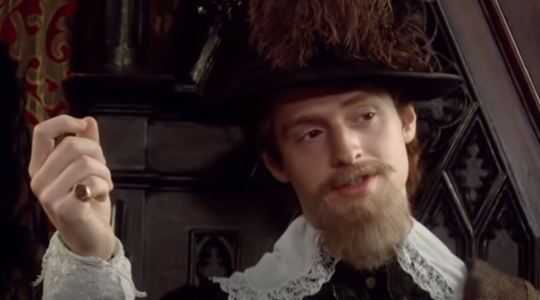
I'm gonna start with King James I of England who ruled in XVII century. Now there are several tumblr posts about this queer legend. Some historians think he was weak and unremarkable but he survived several assassination attempts, kept his power over 3 countries and lived to old age, which is pretty remarkable on its own. He also kept all the religious leaders at bay and commissioned the world's most famous Bible, which is still owned by most Christians 400 years later. He was also the one who created the modern wedding ritual. You know, church, vows, rings, that stuff. He avoided wars and was a patron of the arts, even wrote some books, including one about demons, werewolves and vampires. What a nerd. He was very different from Elizabeth who preceded him, so one contemporary epigram stated "Elizabeth was King, now James is Queen". Oh, also he was very gay. Or, at least, as gay as a king can get. His relationships with his male courtiers were notorious. He had several favourites who had way too much influence over him and his court really hated it.
He needs to have a movie made about him, seriously. I found only one semi-documentary film and it was The King James Bible: The Book That Changed The World (2011). While I liked the film and King James was hot, sassy and very cool, it was disappointing he was shown as perfectly straight. They could just avoid his personal life altogether, but instead they chose to show him being a perfect husband. While it is true that he was nice to his bride, by the time he met her he had a 10-year old relationship with a man 24 years his senior (since he was 14). I'm just gonna use this screenshot from the movie instead of a painting because it's too good.
Perhaps the most notorious of his alleged lovers was George Villiers, 1st Duke of Buckingham. Starting out as a son of a minor gentleman, the 21-year old lad caught the eye of King James I and quickly became his favourite teasing him by dancing in intricate performances called masques. He made a brilliant career becoming a knight, an earl, a Marquess, and finally a duke - a title normally being reserved for members of the royal family - within just 9 years. Can you blame him though? I mean, look at that stud.
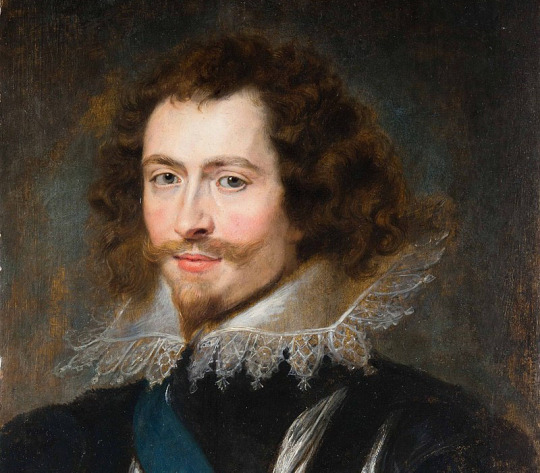
Btw, James’ pet name for Buckingham was ‘Steenie’, derived from St. Stephen who reportedly had the face of an angel.
The name Buckingham seemed oddly familiar to me but it took some time before I realized he was one of the characters in Dumas's "The Three Musketeers". Now I am someone who grew up on old pure Three Musketeers movies so when I started learning about the real historical figures involved in it it gave me a slight shock as the truth is way more weird and sinister that fiction.
The storyline I remember the most was the one where Anne of Austria, the queen of France, got in trouble with her husband Louis XIII because of her affair with Duke of Buckingham. Of course, Duke of Buckingham was never the Queen's lover, he was the King's. What's more, some historians assume Louis XIII was also queer. There is no evidence that Louis kept mistresses, but he had very intimate relationships with his favourites. He has even been described as “repelled by female contact”. There's also the issue of him struggling to have an heir. His wife had 4 pregnancies that were unsuccessful but that seemed like too few for a king who needed to secure his dynasty. After 23 years of trying, the king and queen were finally able to produce a son and another soon followed, the older son to become Louis XIV, and the younger, Philippe, to be known as Duke of Orleans.
Anne was quite the character for a dramatic story too. After Louis's death she became the Regent and made sure to clear the way for her son Louis. To ensure that Louis's younger brother will not try to usurp the power from him as it was with Louis XIII 's brother, Anne of Austria conducted an early and very wicked gender development experiment. She and her adviser, Cardinal Mazarin, set up a plan to raise the two boys very differently. Queen Anne called Philippe by such nicknames as "my little girl" and encouraged him to dress in feminine clothing, which he sometimes did even as an adult.
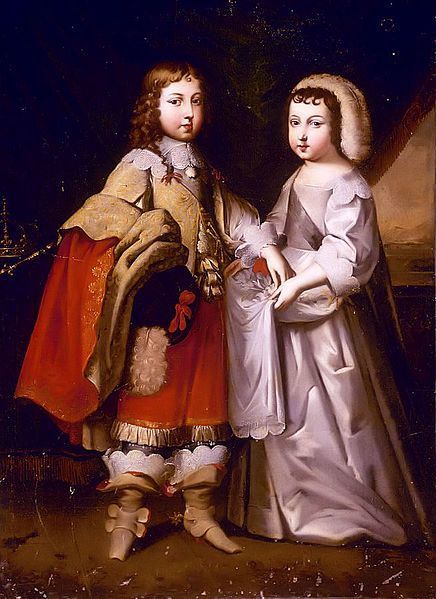
I'm just gonna use this quote because this shit is real: The queen and Mazarin discouraged the duc d'Anjou [Philippe] from traditional manly pursuits such as arms and politics, and encouraged him to wear dresses, makeup, and to enjoy feminine behaviour. His inclination toward homosexuality was not discouraged, with the hope of reducing any threat he may have posed to his older brother. Reportedly, Cardinal Mazarin even commanded his nephew, Philippe, to de-flower the king's younger brother.
Well, fuck. The joke's on them though, as Philippe grew up to be a fashion icon AND a fierce warrior. He participated in many battles and was immensely praised for his bravery and valour. In 1677, he led the French forces at the Battle of Cassel against William III of Orange of the Netherlands. Yes, that guy who later gently invaded England and took the throne. By the way, there are some allegations that he was also gay. Anyway, Philippe was so badass in battle that people glorified him as a hero and it made his stallion of a brother so jealous he sent him back and never allowed him on the battlefield again. Louis XIV continued his mother's effort in encouraging his brother's effeminate behaviour and putting up with his homosexual relationships, all the while waging a war of homosexuality in France. I mean, gotta preserve the traditional values, such as fucking 12 mistresses who were often married. There were even rumours Louis fucked Philippe's wife. I guess he was trying to make up for his father, brother, son, and uncle, César de Vendôme. Meanwhile, Philippe gave no fucks. He had a number of favourites and didn't even try to hide his sexuality. In fact, it is said that every time Louis pissed him off, Philippe did something extra gay and in his face. Fierce.
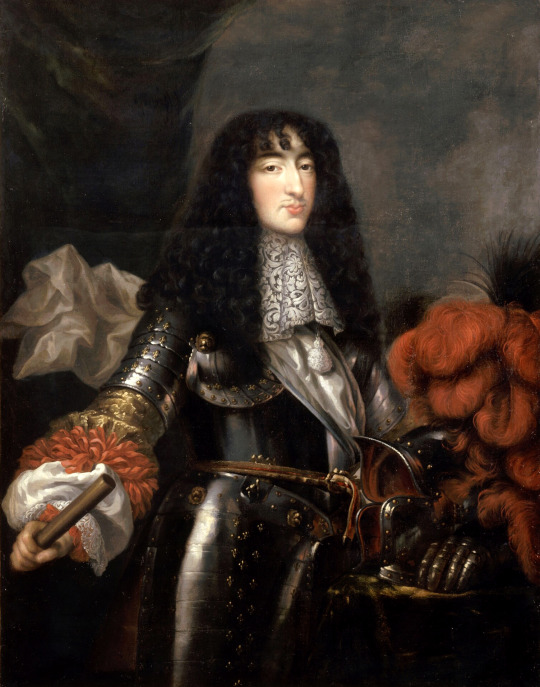
One guy I have to mention is Armand, the Comte de Guiche, who was said to be handsome, vain, and manipulative. Armand was Philippe’s lover, but he is widely thought to have been his wife Henrietta’s lover as well. That apparently wasn’t enough for the guy, because in 1665 he also tried to romance Louise de La Valliere, who was Louis’ chief mistress at the time. Louis exiled him in 1662 for plotting with Henrietta to break up Louis and Louise. What a glorious fucker.
But the love of Philippe's life was Chevalier de Lorraine who was basically a prince of a realm outside France. He's usually called 'Chevallier' but his name was also Philippe. He also had an older brother named Louis. Seriously, couldn't they try a little harder with the names? Anyway, when they met Philippe was 18 and Chevalier 15 and sparks flew. He was described as being “as beautiful as an angel” and was more than ready to use what his mama gave him. He was smart and very manipulative and Philippe showered him with gifts all his life, much to the chagrin of his two wives whose money and estates he often gave away.
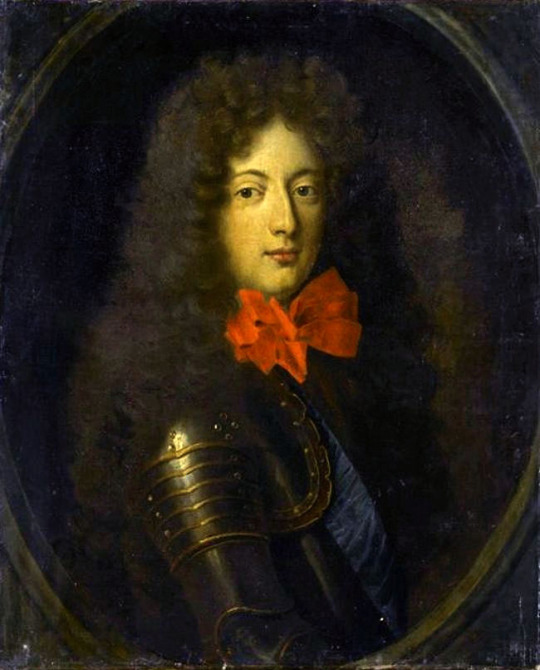
He moved to Palais-Royal, the same palace as Philippe and his wife Henriette. Very convenient. Philippe's marriage got kinda crowded. Chevalier got so arrogant, he actually told Philippe's wife she needs his permission to sleep with him and that he could get him to divorce her. She complained to the king and he got Chevalier imprisoned and exiled. However, not for long as Philippe pleaded the king to pardon him and eventually succeeded. Henriette did not get much relief apparently as she wrote: “I see from the ashes of Monsieur’s love for the Chevalier, as from the dragon’s teeth, a whole brood of fresh favourites are likely to spring up to vex me.” Of course, Chevalier also managed to enrich himself immensely by getting Philippe and the king to give him and his family tons of perks, such as make him the titular Abbot of four abbeys, which payed handsomely.
Henriette died very suddenly claiming she was poisoned. The doctors found no evidence of that, but there were still rumours that Chevalier was to blame. Philippe had to find another wife, even if he wasn't happy about it. Chevalier stuck around. He was exiled a second time after he apparently seduced the king's son (more on that later) but was able to return again. Their relationship lasted for 40 years, until Philippe's death.
There was a recent TV show called Versailles that depicts Louis XIV’s reign and it has a fairly accurate though romanticized portrayal of Philippe and Chevalier's relationship. Too bad the show is way too violent for me to watch. They look stunning in it~
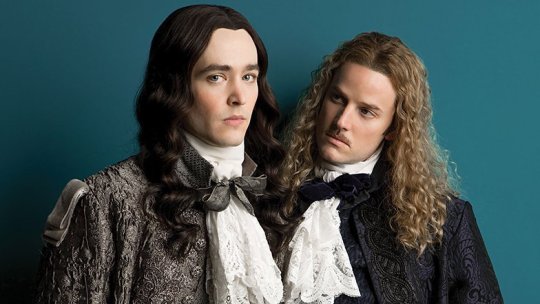
Anyway, such relationships were far from rare. In fact, apparently there were the so-called confréries (“fraternities”), which were basically gay brotherhoods whose members hung out together and set up orgies. One elite brotherhood was founded between 1680 and 1682. Apart from Chevalier, it included the king Louis XIV's cousin Prince of Conti who was once proclaimed the King of Poland, and Louis's illegitimate son, the comte de Vermandois. The latter was 15 in 1682 when at the court of his uncle Philippe, he met the Chevalier de Lorraine and his sect and apparently got very personally acquainted with Chevalier's younger brother and nephew. When the king learned about it, the group was forcibly dissolved and Vermandois was beaten before the king, exiled from court, and forced into marriage. Another such group was within the highest ranks of nobility at the court of Philippe II, Duke of Orléans, the son of Philippe and the regent at the time when Louis XV was young. They really didn't bother with names, huh? Anyway, they got involved in a number of scandals, in one of which that happened in 1722 a group of 17 noble men gathered in the palace gardens to fuck. The Regent didn't seem very bothered and even seemed to find it amusing.
The Regent, who did not stop smiling, was satisfied that it was necessary to give the nobles a harsh reprimand and tell them that they do not have the best taste [goût] in the world.
Dad would be proud.
There were also some (presumably) queer queens, like Queen Anne of England. Now you might have seen the movie The Favourite but it's heavily satirized and Anne wasn't really childlike and helpless. Actually, this image was created by Sarah Churchill, Duchess of Marlborough, after she was expelled by Anne, and stuck. However, the rivalry between the old and new favourites was very real.
Anne met Sarah when she was just 8. Sarah was beautiful, charming and very persuasive. When Anne became the queen, she made Sarah Churchill her Mistress of the Robes (the highest office in the royal court that could be held by a woman) and gave her a bunch of other really cool titles. She also made her husband, John Churchill, a duke. Thus Sarah became the most powerful person in England after the queen and the queen always listened to her advice. However, as years went by, Sarah became increasingly pushy and insensitive, using the queen to get what she wanted.
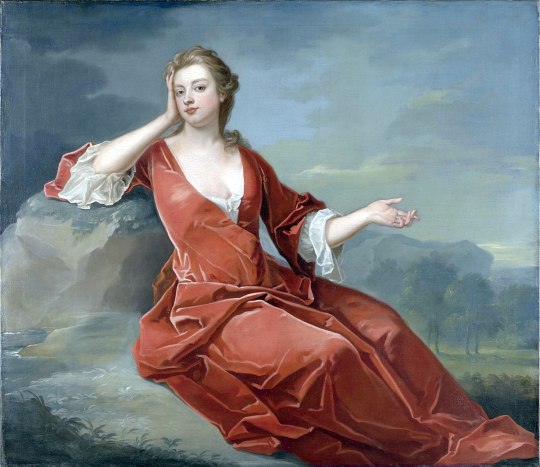
Sarah looking fab~
Then comes Abigail Masham, Sarah's impoverished cousin. Abigail was soft, caring and considerate, exactly what the queen needed. Sarah tried to get rid of her but it only angered the queen further and she eventually dismissed Sarah and her husband and banished them with disgrace while Abigale took her place. Sarah then wrote scandalous memoirs, painting the queen as weak and instable, as well as implying that her relationship with Abigail was lesbian. In mid-1708, she helped to circulate a ballad with such lyrics as: “Her secretary she was not / Because she could not write / But had the conduct and the care / Of some dark deeds at night.”
While there is no direct evidence that she and Anne had sexual relationship, there are many letters between the women that are very romantic and intimate. Sarah even used them to blackmail the queen. And you can kinda see why. “Tis impossible for you ever to believe how much I love you except you saw my heart,” the princess wrote in one letter, as quoted in Anne Somerset’s biography of Anne. “If I writ whole volumes I could never express how well I love you,” read another.
Also, like, evidence was hardly even a thing with queer relationships, since the only solid evidence of regular affairs were illegitimate children.
Finally, I really want to talk about Frederick II, the king of Prussia. Buckle up because this is gonna be long.
Until the age of 7 Frederick was growing up with his lit mother and sister. Here they are, looking gorge. I think he's in blue but tbh I'm not 100% sure.
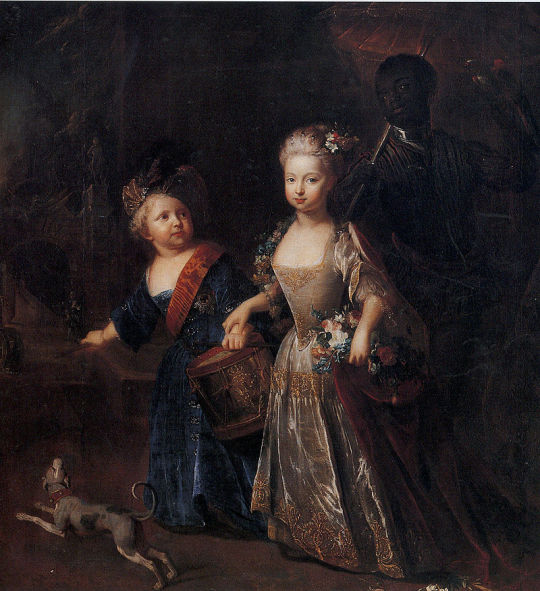
Anyway, as he got older he was taken to his father and that's when things got shitty. His father, Frederick William I, was the model image of toxic masculinity. He was all about power and military and expected his son to be the same. And since the boy was a lot more into music, poetry, and French stuff, his father often beat and humiliated him. He didn't allow him to learn French and Latin because, like, that's so gay. Now he was a real man. With a weird kink for tall guys. He is known for creating the Potsdam Giants, a regiment of very tall men that he didn't use for battle, just dressing them up and making them march. Ultimate straightness. It is probably redundant to say but his father also hated 'sodomy' and it was punishable by death, a law Frederick would repeal.
And the thing is, Frederick wasn't even supposed to become a king. He was the third son. It wasn't even disease. The first son died because a volley was fired close to his crib (because that’s the only way to wake up a real man - canon) and the second died at baptism because the royal crown crushed his skull. And you thought your parents were bad. Poor Frederick didn't even want to be a king, he just wanted to play the flute and do his thing. In a different age he'd be writing musicals on Broadway or something.
Anyway, there are few doubts among historians the man was gay. There's this BBC documentary that downplays it but it keeps saying he grew up in an environment where he was "leading a double life" and that he once wrote to a close friend that he felt he was a mirror that dared not be what nature made it, forced to oblige what was around it. Please.
Frederick's first presumed relationship was at 16, with Keith, the king's 17-year-old page. Unsurprisingly, Keith was soon sent to a far-off frontier. Right after that, however, Frederick got real close with an officer Hans Hermann von Katte. The dude was very woke and they both loved music and poetry but shit got very real very soon. In 1730, Katte and Frederick decided to flee to Britain to escape their despotic fathers. Sadly, they got caught and tried for treason. Although the prince was pardoned, Katte was sentenced to life imprisonment, which his sick dad changed to execution and then forced Frederick to watch it. At execution Katte and Fred shouted to each other endearments in French and before it happened, Frederick fainted. That shit really fucked him up and he got depressed but he toughened up and accepted his fate.
Aged about 20, Frederick was expected to marry. After a few failed attempts, an Austrian bride was selected, Elisabeth Christine of Brunswick-Bevern. Frederick was clearly unexcited and apparently even threatened suicide. As soon as he had secured throne, he sent her away and only met with her out of necessity. They had no children. And some historians are like, "well, they just didn't get along". Well, his folks hated each other but it didn't stop them from having 14 children.
Anyway, his father finally got off his back and as a crown prince, he mostly spent his time reading, composing, watching plays and writing woke political essays. Then his dad died so playtime was over.
Now that sounds like a story of a "weak" king. A man who loved to read books and play his flute. But it's not how it was. As Fred became king, he inherited a very militarized state with a huge-ass army and he worked with what he had. He started expanding Prussia, starting with Austria, which he had old beef with. He wasn't out for world conquest, he struck swiftly and strategically to consolidate and strengthen his state.
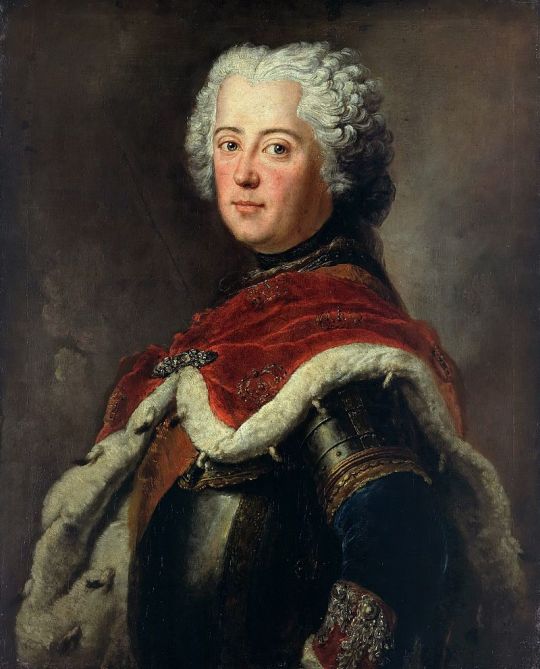
Frederick, widely known as Frederick the Great, waged war against much bigger armies with great success and doubled Prussia's size in his reign. Which is why Hitler was obsessed with the guy smh. Would make more sense if he was into the Frederick Senior, with his militarism and his little hobby of inbreeding giants and all. He must have missed the part where he was tolerant, modest and also gay.
Frederick also had a younger brother, Prince Henry, who was also gay. He was an important general in the king's army, though their relationship was quite complicated. Henry married but like his brother, bore no children, ignored his wife and spent time with fine lads.
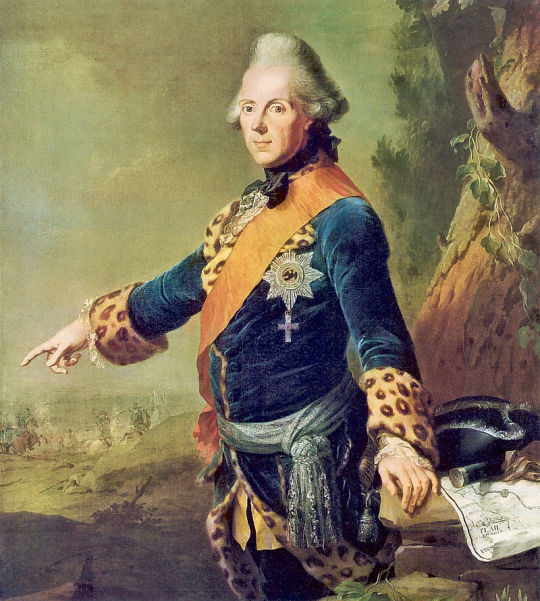
Look at this unapologetic legend!
When Frederick wasn't battling, he was doing lit stuff. He built a gorgeous palace in French fashion, full of Grecian sculptures and homoerotic paintings. He attracted the best intellectual minds of his time. Voltaire lived there for 3 years btw and he did not hold back to make many "wink wink" references to the king and his Grecian taste.
Speaking of which... One of his closest friends was Michael Gabriel Fredersdorf, an army private and a son of a peasant. Frederick met him as a prince and kept him by his side for the rest of his life, quite literally as he had an adjoined bedroom in his palace. He also made him a chancellor and gave him an estate, which really pissed off the elites.
Frederick is a complex character. Sure, he waged war and very successfully asserted himself as one of the top military leaders in history. But at the time Prussia was a scattered landlocked state, it couldn't just opt out of war so it's not like he could just go "peace out, bitches". But he did so much more. The guy actually believed that the king's duty was to be just and improve the lives of his people. He did some major reforms, improved education, supported art, and practiced religious tolerance, which was pretty woke at the time. He abolished torture and corporal punishment. He made governing more democratic by hiring people based on ability, not just status. Sadly, his cool legacy was utterly destroyed because the Nazi decided to appropriate him as their idol but lately it’s being reassessed. It’s hard to judge him considering how much he went through. But despite it all he became one of the best military commanders in history, one of the most woke and talented monarchs, and of course a legendary queer!
Disclaimer: I know all of these people did some terrible shit, at least by modern standards, but I'm here to have fun so I'm not going to go there now. Sources: medium.com/@LukeBoneham/the-politics-of-desire-... thehistoryofparliament.wordpress.com/2019/02/21... www.ranker.com/list/life-of-philippe-dorleans/m... cour-de-france.fr/vie-quotidienne/sociabilite-e... aelarsen.wordpress.com/2018/07/20/versailles-th... thedrummersrevenge.wordpress.com/2007/06/22/ref... dirtysexyhistory.com/2017/09/03/a-secret-gay-br... unspeakablevice.tumblr.com/post/82525976110/lou... journals.openedition.org/crcv/14427#ftn161 Marie Antoinette's World: Intrigue, Infidelity, and Adultery in Versailles The Real Versailles - BBC Two
BBC Four - Frederick the Great and the Enigma of Prussia https://medium.com/war-is-boring/historys-greatest-gay-general-fd7d1d311464 https://www.queerportraits.com/bio/frederick https://www.spectator.com.au/2015/10/frederick-the-great-king-of-prussia-is-a-great-read/ http://gayinfluence.blogspot.com/2011/10/frederick-great-1712-1786.html https://www.history.com/news/true-story-queen-anne-sarah-abigail-the-favourite-fact-check
#King James I#Duke of Buckingham#George Villiers#Philippe Duke of Orleans#Queer History#Chevalier de Lorraine#Queen Anne of England#Frederick the Great
103 notes
·
View notes
Note
Would you mind telling us a few little-known facts about Charles II? I'm always interested in learning the side of history that is rarely talked about.
• He was a Gemini
• He never swore: usually, to emphasise himself, he said 'Odd's fish!' which comes from 'God's flesh!'
• Whilst he was incredibly fashionable, he also liked to wear darker, sober colours. So he often adopted French, foppish fashions but in black.
• He loved dogs, as we know: he slept in the same bed as his spaniels and took them to Parliament and Privy Council meetings.
• It's often pointed out that Nell Gwynn is the only one of his major mistresses that never received a title. This is true but it is believed he was going to give her a title (Countess of Greenwich, perhaps) but died before he could complete this.
• He proposed to his cousin, Sophia of the Palatinate whilst he was in exile but she turned him down because his pick-up line was essentially 'You're almost as pretty as my mistress.' Sophia would later go on to birth the future King George I of Great Britain and become the mother of the Hanoverian dynasty in Britain.
• He was also interested in Hortense Mancini during his exile (this was at Louis XIV's court). Her uncle, Cardinal Mazarin, was not impressed with the match because Charles didn't have a kingdom at that point. As we know, years later, Hortense would become Charles's mistress (before she decided she preferred his daughter instead)
• At Windsor, he had a formal, decadent bedroom that was used for the levee and coucher and ceremonial stuff. Right next door was his more private bedroom: his bed here would have been more like a giant camp-bed (sleepover with the lads) and there's a secret door in the room that leads down to where Louise de Kerouaille's apartments were.
• On Christmas Day, 1663, Samuel Pepys reported that Charles had give all his Christmas presents to Barbara Villiers.
• He really loved science and was always doing scientific experiments (once with the remains of foetus that had been miscarried at a palace ball). He was always incredibly interested in the findings of the Royal Society, of which he was patron (though he found it funny that they spent a lot of time trying to weigh air and trying to extract sunbeams out of cucumbers). He also collected clocks.
• When the Earl of Rochester presented his famous humorous epigram to the King ('We have a pretty, witty King, whose word no one relies on. He never said a foolish thing, nor ever did a wise one"), Charles laughed and said 'Very true, for my words are my own but for my actions, you must blame my ministers'
• His favourite food was ambergris which, I'm afraid to tell you, is regurgitated whale phlegm (but apparently very tasty, very sweet smelling and very expensive)
• He mentioned three women on his deathbed - his wife, Louise de Kerouaille, and Nell Gwynn.
• He was pretty instrumental in making sure the Great Fire of London wasn't as devastating as it could have been. He and his brother worked alongside the Londoners, pulling down houses (to stop the fire in its tracks) and passing buckets of water down lines.
• He was only 55 when he died, not old at all! His death was pretty prolonged, though, and he apologised to everyone for taking so long: 'My lords, you must pardon me for I fear I am an unconscionable time a'dying'
• He actually once celebrated his own "death" when he was in his 20s. When he was travelling across the English countryside, trying to escape the Roundheads after the Battle of Worcester in 1651, he came across a party in a small village. He joined in the celebrations and asked what was the occasion - one of the residents told him it was because they'd learnt that Charles Stuart (he himself) had died. He carried on!
• There are lots of anecdotes related to this escape in 1651 but one of my favourites is the fact that he disguised himself as the manservant of a young gentlewoman called Jane Lane. One problem, however, is that he was of pretty uncommon proportions for a servant. He was well over 6ft and his limbs were big, so holes had to be made in the sides of his shoes so they'd be comfortable (they were too small for him)
• When he was restored as monarch, Isaac Oliver painted several portraits depicting his famed escape from England in 1651. Two things: Charles has his fly undone in one of these pictures, and when he actually saw the portraits, Charles laughed 'Is this how you see me? But odd's fish, I am an ugly fellow!'
112 notes
·
View notes
Text
Next part
For @elizadoolittlethings
Jonson was not in the mood for the dinner party, but it was impossible to resist Pembroke. Wishing to celebrate the recovery of his best friend, he gave a real celebration, gathering at the Wilton House all those whom it is possible and even impossible. However, Johnson frankly missed, showing his true attitude to what was happening and to the crowd with all his views, thinking about the epigram that he would certainly devote to the earl after that evening. He refused to dance with Lady Mary Wroth, but for some time he talked to her calm, perfectly educated husband, whom he almost liked for his mind and character. Sir Robert Wroth lived in the village and stoically demolished the mockery of others because of his cuckold reputation.
Gentle memories of youth did not give him a completely indifferent attitude to Mary Sidney, the mother of the earl, although she lived hard. The husband deprived her of her inheritance, having reduced even the widow's share to a minimum and took away all her jewels from the dowry in order to give them to her eldest son. William did not really love his mother and sometimes frankly neglected her, which complicated her position in society, and the act of her husband made her completely dependent on the will and mood of her eldest son. However, the Countess understood that she somehow deserved the wrath of her husband and spent most of her time at Spa or at Crosby Hall in London, if William allowed her. Although the women smokers were annoying Jonson, he nevertheless approached Mary Pembroke when she called him. In memory of what happened in his young years "We lived next door, met just like that." The past died long ago, but Jonson was one of the few who still treated her as her dignity required.
Finally, tired of the noise and uninteresting people, he decided to leave and suddenly, in the very corner of the ballroom he noticed Mary, Countess Talbot, the wife of William Pembroke. A charming, miniature countess with long blond hair sat alone in the farthest corner, unnoticed by anyone, as if she were a shadow. Jonson felt sorry for her. He approached, bowed slightly to her and asked:
- You will not mind, Your Highness, if I dare to share your loneliness? May I? - He glanced at the chair nearby. Mary Talbot nodded and smiled. A sad smile made her face more charming. Jonson thought that compared to the long-faced and long-nosed Mary Wroth, the little countess seems to be a beautiful fragile fairy. Mary Wroth, jealous of her beauty, called her “dwarf” and this evil nickname stuck to Countess Talbot with the efforts of two cousins- Mary Wroth and Elizabeth Sidney, countess of Rutland. They envied not only her beauty, but also her wealth. Parents gave her the greatest dowry in the empire, Earl of Talbot was one of the richest people in the country and loved his daughter very much, giving her almost half of his fortune to the dowry during his life and bequeathing almost everything else to her and William.
- Of course, Mr. Jonson. If you are not against my company. See, I'm not very popular here. Not afraid to ruin your reputation?
- Do I, miserable comedian, take care of my reputation, Your Grace. Are you not afraid of your spouse's jealousy?
-He won't notice, Mr. Jonson,- smiled the countess, -I'm not Lady Wroth. I'm just a shadow. Women are only the shadows of men ...
-What are you talking about, my dear? Shadows? Do not annoy Mr. Jonson with your stupidities, - Pembroke suddenly appeared nearby, looking for Johnson.
- Shadows! Shadows! –Countess of Talbot said with such bitterness that even Pembroke suddenly stopped talking, looking at his young wife. And she continued:
- Shadows! Confirm this, Mister Jonson, please, I beg you. I'm a shadow here! No one! Empty place! No one sees me, just does not notice, like a miserable shadow on the wall!
-You're wrong, my dear, - muttered the embarrassed earl, who paid the least attention to his wife.
- Not right, earl? Wrong? Do you notice me? You haven't seen me for weeks, as if I don't exist! And is it your noble mother better than a shadow? She has not said a word to me since our wedding day, not a single word! Because it is unworthy to the sister of the Great Phoenix to condescend to the jailer's daughter! She despises my father- what, the pitiful jailer of Queen Mary Stewart, but nevertheless, when you refused to repair Crosby Hall, from whom did she take the money? From the despicable jailer! You should have seen how wonderfully kind she was with him, just charming! And how she talks about him now, until she again needs his wallet! You say I'm wrong, earl? You are silent …Your brother treats me like a piece of furniture, if I disappear, you both will not even notice. Especially if my dowry remains. Your cousin Elizabeth is so exalted and poetic, the daughter of Phoenix, so special that she calls me a twisted dwarf at court. You think I can't hear it? Do you think I have no feelings, earl? I do not notice anything, I do not hurt? Do not hurt? Why are you silent, spouse mine? It's stupid to talk with a shadow, is it? Mister Jonson, resolve our dispute. Prove it. That women are only the shadows of men. Please - Mary Talbot broke down and cried. And Johnson kissed her hand and said, expressively looking at the earl, who completely embarrassed:
- Of course, your ladyship. I will prove it. Always at your service.
When the count woke up at two o'clock the next day, a folded sheet of paper was waiting for him. Pembroke unfolded it and read:
Follow a shadow, it still flies you; Seem to fly it, it will pursue: So court a mistress, she denies you; Let her alone, she will court you. Say, are not women truly then Styled but the shadows of us men? At morn and even shades are longest, At noon they are or short or none; So men at weakest, they are strongest, But grant us perfect, they're not known. Say, are not women truly then Styled but the shadows of us men?

Mary, countess of Talbot remind Jennifer Morriso a little. And it’s a true- Mary Wroth started call her dwarf
4 notes
·
View notes
Text
National Poetry Month #8 - Nicholas Grimald - To His Familiar Friend
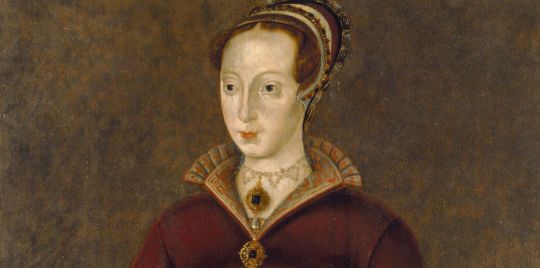
[Image: Couldn’t find an image of Grimald I liked, so here is Lady Jane Seymour]
Please don’t get whiplash as we jump from the 21st century back to the 16th. Five hundred years back to pre-Elizabethan England, a time full of intrigue and betrayal, the end of the Reformation, the death of Henry VIII, the short reign of Queen Jane, and the bloody ascension of Mary I to the English throne. I’m no expert in this time period. Bob Blair probably is. I was, however, intrigued with Nicholas Grimald, who, while not a member of the nobility, seems to have ingratiated himself to many of it members of the time period.
This is a time when poetry was going through significant changes, and when it was one of the forms of messaging between the younger people at court. I base this partly on a volume known as Tottel’s Miscellany (“Songs and Sonnettes”) which was the first general poetry anthology of its day, and was widely popular in Elizabethan times - even quoted by Shakespeare in his plays.
The larger share of Richard Tottel’s volume was made up of poems by Henry Howard, Earl of Surrey, and Sir Thomas Wyatt. Grimald’s poems show up heavily in the first edition, which he probably helped edit, and sparsely in others. He fell out of favor when he renounced his Protestant faith after being imprisoned when Mary took the throne, and betrayed his mentor Bishop Nicholas Ridley and two others who was later burned at the stake. (I’m skipping over a lot of details here). He also may have composed some of the first blank verse published in English. The few poems by Grimald that weren’t tossed out in later editions were marked only with his initials, N.G..
In addition to the sonnets that the book is most noted for, there were many other poems. About 39 were originally by Grimald, and a few by other known authors, but over ninety were miscellaneous pieces of unknown authorship (hence the original name of the book). Some are essentially love letters, some are gossip, some are insults - it’s quite a grab-bag of forms and topics. Some of them make sense, and some of them, well, imagine what a historian might think when dredging through your text messages five hundred years from now.
My theory (based on no expertise whatsoever) was that Grimald either collected these and gave them to Tottel, or perhaps the reason he was tolerated at Court was that he penned them for the gentry. Some of the likely pieces written by Grimald are to Lady Jane Seymour (third wife of Henry VIII) and her sisters, and two probable romantic interests, Carrie Day and Damascene Awdley. He never married, and little is documented about his later life. Perhaps by sharing the court notes he made himself more of a social pariah than his betrayal or his conversion to Catholicism.
So what is today’s poem? After such a long introduction it is something very short: an Epigram - one based on a work by a French author of the period, Marc Antoine Muret:
To His Familiar Friend
[Proofed against the 1557 'A' edition of Tottel's Miscellany, #148; based on an epigram by Muretus --Steve]
NO IMAGE carved with cunning hand, no cloth of purple dye, No precious weight of metal bright, no silver plate give I: Such gear allures not heavily hearts: such gifts no grace they bring: I lo, yet know your mind, will send none such, what then? nothing. -- Nicholas Grimald
Or, in short, I knew you wouldn’t want anything fancy as a gift, so I didn’t get you anything.
-- Steve
#nicholas grimald#grimald#tottel#lord vaughn#henry wotton#earl of surrey#henry howard#sonnet#enhlish#poetry#poem#poet#national poetry month#the other pages#theotherpages.org
1 note
·
View note
Photo

422. Epigrams against the Earl of Galloway by Robert Burns WHAT dost thou in that mansion fair? Flit, Galloway, and find Some narrow, dirty, dungeon cave, The picture of thy mind. ———No Stewart art thou, Galloway, The Stewarts ’ll were brave; Besides, the Stewarts were but fools, Not one of them a knave.
- http://moby.to/4du9zg
0 notes
Photo

Picture: Margaret, Duchess of Burgundy, by an unknown artist. Notice the B pendant on her hood, it's very similar to Anne Boleyn's B. On this day in history, 3rd May... 1415 – Birth of Cecily Neville, Duchess of York, daughter of Ralph Neville, 1st Earl of Westmorland, and Joan Beaufort. Cecily was the wife of Richard, 3rd Duke of York, and the mother of twelve children, including Richard III, George, Duke of Clarence, and Edward IV. 1446 – Birth of Margaret, Duchess of Burgundy, also known as Margaret of York, third daughter of Cecily Neville (see above) and Richard, 3rd Duke of York. She was married to Charles the Bold, who became Duke of Burgundy, and she was godmother to Emperor Charles V. 1524 – Death of Richard Grey, 3rd Earl of Kent, son of George Grey, 2nd Earl of Kent, and Anne Bourchier (née Woodville). 1536 - A very shocked Archbishop Thomas Cranmer wrote to King Henry VIII regarding his patron Queen Anne Boleyn’s arrest. 1568 – Death of Sir Edward Rogers, courtier, member of Parliament and Comptroller and Vice-Chamberlain of the Household to Elizabeth I. Rogers served Henry VIII as Esquire of the Body, Sewer of the Privy Chamber and Carver; Edward VI as a Gentleman of the Privy Chamber and Elizabeth I as Vice-Chamberlain, Captain of the Guard, Privy Councillor and Comptroller. In Mary I's reign, he was imprisoned for a time after being implicated in Wyatt's Rebellion. 1580 – Death of Thomas Tusser, poet, farmer and writer on agriculture, at the age of sixty-five. He was buried at Manningtree in Essex. Tusser is known for his “A Hundreth Good Pointes of Husbandrie”, a poem recording the country year, and “Five Hundreth Points of Good Husbandry United to as many of Good Huswiferie”, an instructional poem on farming. 1610 – Death of Sir William Skipwith, member of Parliament, Sheriff of Leicestershire and poet. In his “Worthies of England”, author and historian Thomas Fuller described Skipwith as “dexterous at the making fit and acute epigrams, poesies, mottoes and devices”. He was buried at Prestwold Church in Leicestershire.
0 notes
Text
THE MOVIES
A FEW
A GENTLEMAN
AN ABOMINATION
A DRINKE
A CLOWN
A NORTHERN
AN AMERICANISM
AN EXTRACT
A CURRENT
AN ENGLISHMAN
AN EYE
A GOLDEN
AN INSTANCE
AN ACCOUNT
AN AMERICAN
A VERB
A YANKEE
A VULGARISM
A TYPE
A MIXTURE
A FARMER
A PASSAGE
A REMINISCENCE
A FRENCH
A FUTILE
AN ANACHRONISM
AN EXPERIMENT
AN EPIGRAM
A LANDLADY
A SERPENT
A CITATION
A LEXICOGRAPHER
A SMOTHERED
A LOCUTION
A SIGHTE
A FRIEND
A SMALL
AN ADVERB
A GENTLEWOMAN
A TERM
AN ANGLO
A PLACE
A MISPRINT
AN HERTE
A WAITER
A CORRUPTION
A REDUPLICATION
AN ENGLISHMAN'S
A NORFOLK
AN ACRE
AN ACCOMPLICE
A RARERIPE
A WORD
A SURREBUTTER
A CONCLUSION
AN L
AN EXAMPLE
A LETTER
A MILL
A PROLONGATION
A YEAR
AN EARL'S
A WEEDE
A PIECE
AN INFERIOR
A MR
A BLOW
A BISHOP
AN IDENTITY
A DAMN
A SEMI
A SENTENCE
A DAY'S
AN IMPORTATION
A MONOSYLLABLE
A HORN
AN INTENTIONALLY
A CUSS
AN INQUIRY
A CRESS
A NEGRO
A PLAINTIVELY
A STREAM
A SIGH
A DOZEN
A TEXT
A BOAT
0 notes
Text

I posted 821 times in 2021
756 posts created (92%)
65 posts reblogged (8%)
For every post I created, I reblogged 0.1 posts.
I added 781 tags in 2021
#kato shigeaki - 223 posts
#masuda takahisa - 201 posts
#koyama keiichiro - 85 posts
#3nin - 69 posts
#richard ayoade - 47 posts
#l'arc~en~ciel - 38 posts
#shop photos - 38 posts
#hyde - 28 posts
#story tour - 27 posts
#the crystal maze - 25 posts
Longest Tag: 93 characters
#i certainly do not have a thing for sassy awkward intelligent tall men in old-fashioned suits
My Top Posts in 2021
#5


See the full post
47 notes • Posted 2021-08-28 23:53:24 GMT
#4
XVII-XVIII Century Royal Queer History
Unexpectedly to myself, I got really engaged in history of Europe of XVI-XVII centuries. I never really had much interest in kings and queens and didn't know much about them but once I began to read and learn about their personal lives, I got kinda hooked. Also, I was struck by how many of them were queer and I began to write down my findings, which inevitably turned into a freaking study. I thought I might as well post it.

I'm gonna start with King James I of England who ruled in XVII century. Now there are several tumblr posts about this queer legend. Some historians think he was weak and unremarkable but he survived several assassination attempts, kept his power over 3 countries and lived to old age, which is pretty remarkable on its own. He also kept all the religious leaders at bay and commissioned the world's most famous Bible, which is still owned by most Christians 400 years later. He was also the one who created the modern wedding ritual. You know, church, vows, rings, that stuff. He avoided wars and was a patron of the arts, even wrote some books, including one about demons, werewolves and vampires. What a nerd. He was very different from Elizabeth who preceded him, so one contemporary epigram stated "Elizabeth was King, now James is Queen". Oh, also he was very gay. Or, at least, as gay as a king can get. His relationships with his male courtiers were notorious. He had several favourites who had way too much influence over him and his court really hated it.
He needs to have a movie made about him, seriously. I found only one semi-documentary film and it was The King James Bible: The Book That Changed The World (2011). While I liked the film and King James was hot, sassy and very cool, it was disappointing he was shown as perfectly straight. They could just avoid his personal life altogether, but instead they chose to show him being a perfect husband. While it is true that he was nice to his bride, by the time he met her he had a 10-year old relationship with a man 24 years his senior (since he was 14). I'm just gonna use this screenshot from the movie instead of a painting because it's too good.
Perhaps the most notorious of his alleged lovers was George Villiers, 1st Duke of Buckingham. Starting out as a son of a minor gentleman, the 21-year old lad caught the eye of King James I and quickly became his favourite teasing him by dancing in intricate performances called masques. He made a brilliant career becoming a knight, an earl, a Marquess, and finally a duke - a title normally being reserved for members of the royal family - within just 9 years. Can you blame him though? I mean, look at that stud.
See the full post
54 notes • Posted 2021-01-24 17:08:48 GMT
#3


See the full post
62 notes • Posted 2021-08-29 12:16:55 GMT
#2


See the full post
82 notes • Posted 2021-05-17 19:59:01 GMT
#1

Summer '21 joke.
101 notes • Posted 2021-07-12 14:29:38 GMT
Get your Tumblr 2021 Year in Review →
3 notes
·
View notes
Text
Still unnamed, but
For @elizadoolittlethings
William Pembroke considered it his duty to almost never leave Jonson’s bedroom and hardly left him. When Johnson began to recover, Pembroke literally tore the paper out of his hands, bearing in mind Butler’s advice not to let the patient overwork. Pembroke did not even allow Jonson to edit his poems, although he usually asked him to do so. Johnson languished from boredom and proceeded with poison, training his wit on a young earl, but it did not even help the threat of devoting an epigram to Pembroke in a new compilation that Jonson began preparing several months ago.
From madness from boredom, Jonson was saved by an unexpected visit by Herbert, the cousin of the earl. Pembroke remembered that Jonson didn’t stand Herbert and tried as best as he could to reduce the visit of his relative, literally putting him out of the house. However, this behavior of young earl, spoiled by his parents did not surprise anyone. His father indulged him, the late queen spoiled him, the king quite successfully picked up her mission and the earl did only what he considered necessary. But still he was away for an hour, leaving his valet in his place.
As soon as the earl came out, Johnson ordered:
-Duncan, give me the pen and paper immediately. Immediately I say.
-But mister Jonson, his lordship forbade me …
-Do thee really prefer me to tell his lordship that thou do not fulfill my requests?
-I will explain to his lordship that you asked for pen and paper, mister Jonson, and I hope he will understand me.
-Okay, Duncan, tell him that. And I will tell his lordship that it was thee, who told Lady Fitton that he returned from Wales in exchange for five guineas.
When Pembroke returned to the bedroom, Jonson put down the paper, obviously thinking about something. Pembroke was always struck by Jonson’s handwriting, crisp and elegant, as there were almost no corrections on the page. Jonson remembered the advice of his mentor to write down only the perfectly obtained lines.
-Did you write, mister Johnson? But doctor Butler has forbidden you to overstrain!
- Am I overtired? This is just a trifle, a few awful lines.
-Please, let me see, mister Jonson!
- Are you sure, earl? However, I do not care.
The earl took the sheet and saw that it was a short poem, just five lines:
In the ember days of my last free summer, here I lie, outside myself, watching the gross body eating a poor curry: satisfied at what I have done, scared of what I have to do in my last free winter.

2 notes
·
View notes
Text
Next part of still unnamed story
For @elizadoolittlethings
William Pembroke considered it his duty to almost never leave Jonson’s bedroom and hardly left him. When Johnson began to recover, Pembroke literally tore the paper out of his hands, bearing in mind Butler’s advice not to let the patient overwork. Pembroke did not even allow Jonson to edit his poems, although he usually asked him to do so. Johnson languished from boredom and proceeded with poison, training his wit on a young earl, but it did not even help the threat of devoting an epigram to Pembroke in a new compilation that Jonson began preparing several months ago.
From madness from boredom, Jonson was saved by an unexpected visit by Herbert, the cousin of the earl. Pembroke remembered that Jonson didn’t stand Herbert and tried as best as he could to reduce the visit of his relative, literally putting him out of the house. However, this behavior of young earl, spoiled by his parents did not surprise anyone. His father indulged him, the late queen spoiled him, the king quite successfully picked up her mission and the earl did only what he considered necessary. But still he was away for an hour, leaving his valet in his place.
As soon as the earl came out, Johnson ordered:
-Duncan, give me the pen and paper immediately. Immediately I say.
-But mister Jonson, his lordship forbade me ...
-Do thee really prefer me to tell his lordship that thou do not fulfill my requests?
-I will explain to his lordship that you asked for pen and paper, mister Jonson, and I hope he will understand me.
-Okay, Duncan, tell him that. And I will tell his lordship that it was thee, who told Lady Fitton that he returned from Wales in exchange for five guineas.
When Pembroke returned to the bedroom, Jonson put down the paper, obviously thinking about something. Pembroke was always struck by Jonson's handwriting, crisp and elegant, as there were almost no corrections on the page. Jonson remembered the advice of his mentor to write down only the perfectly obtained lines.
-Did you write, mister Johnson? But doctor Butler has forbidden you to overstrain!
- Am I overtired? This is just a trifle, a few awful lines.
-Please, let me see, mister Jonson!
- Are you sure, earl? However, I do not care.
The earl took the sheet and saw that it was a short poem, just five lines:
In the ember days of my last free summer, here I lie, outside myself, watching the gross body eating a poor curry: satisfied at what I have done, scared of what I have to do in my last free winter.

I try to translate this verses about five or six time, hate myself and love this unnamed poem.
0 notes